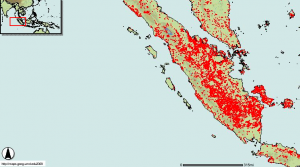In a twist of fate, Jakarta’s Tempo is reporting that Arif Mundar, one of Indonesia’s climate negotiators, could not make it to the international climate summit in Bangkok because of heavy smoke in Sumatra.
Too many forest fires to even participate in climate talks? It is not looking promising for those in Bangkok that want to use the current momentum behind climate negotiations to curtail deforestation and deforestation’s associated carbon emmissions.
The dreaded climate fluxuation El Nino has officially descended upon Indonesia this year. Memories of the 1997 El Nino fire season remain fresh in Indonesian’s minds as a disaster for their forests, the global climate, and Indonesia’s national pride.
Some see this year’s already horrible fires in South Sumatra as a sign of climate change itself. Widely cited projections for Indonesia done by the WWF show that Sumatra will have much more intense dry seasons under future climate scenarios, leading to greater intensity and extent of forest fires. South Sumatra, ground zero for Indonesia’s pulp-and-paper and timber operations, run by industry giants Sinar Mas and Raja Garuda Mas (now officially pontificated as ‘Royal Golden Eagle’), has been struggling with widespread fires the past few months.
Many experts point to changes in land use – associated with the logging and palm oil industries – that increase forest landscapes propensity to burn as a key factor in these fires. In the Sumatran province of Riau alone, 1.6 million hectares of peat and forests are expected to burn this year. These kinds of massive fires are what place Indonesia as the world’s third largest contributor to climate change. Peat lands are the world’s most carbon rich organic material, when they burn the climate suffers.
Conservationists on the ground say that many of the 2,500 fires spotted this year by NASA have been set illegally by oil palm and pulp and paper companies. This is deforestation in its most damaging form, bad for ecosystems, forest peoples, and the climate. The smoke is so thick, and visibility so curtailed, that the Jambi and Riau airports have been repeatedly shut down this year.

RAN’s own Margaret Swink is at the Bangkok meetings, and artfully shows just how high the stakes are for Sumatra’s forests leading up to a post-Kyoto climate treaty in 2012. As climate change makes South Sumatra region even drier during the dry season, and multinational industrial agribusiness makes forests more likely to burn, the negotiators at Bangkok can not even come up with an acceptable definition of ‘forest’. Yikes.
David Gilbert is a RAN research fellow. He has lived and worked in the rainforests of the Amazon and Indonesia. David has a special interest in how conservation and indigenous right activities can be mutually reinforcing.